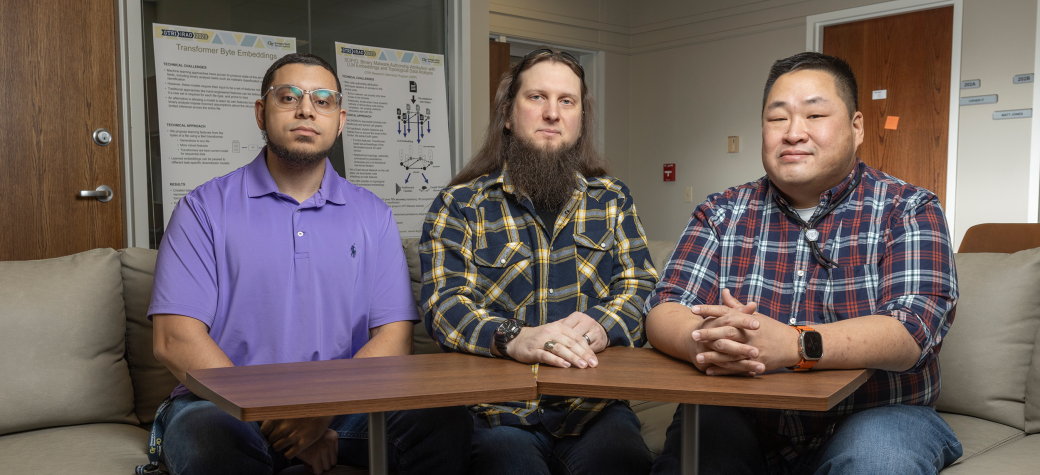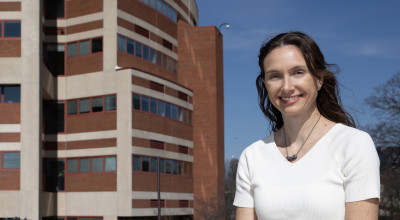
Three GTRI researchers made it to the finals and came home with second place in the "Southeastern Cyber Cup" competition, a multi-day, national-level, higher education competition and cyber hacking event held last month. The three researchers are Justin Hsu, Garrett Brown, and Drew Petry. Their team, named the "Clockcycles," was one of the 15 finalists in the event. Georgia Tech made an impressive mark, with eight teams among the final 15.
The Southeastern Cyber Cup is hosted by Georgia Tech’s Office of Information Technology in partnership with Deloitte. The virtual hacking event is open to cybersecurity and IT students and professionals and is held to generate enthusiasm and excitement around cybersecurity careers.
As part of the annual competitors are challenged to find a "flag": a string of text. The flags for each challenge are submitted online to receive points. Challenge categories include network, web, crypto, miscellaneous, forensics, and reverse engineering.
Why Is the Southeastern Cyber Cup Important for GT/GTRI?
The Southeastern Cup and similar competitions are among the many ways that Georgia Tech and GTRI can showcase the skills of its researchers and aid in their professional development. The team’s Southeastern Cyber Cup win also indicates GTRI's role as a leader in the field of cybersecurity.
“Historically, CTF (Capture the Flag) competitions are a practical way to sharpen the skills that any cybersecurity researcher/enthusiast may utilize during their career. If you’re interested in cybersecurity, CTFs are a great way to add new tools to your toolbox, as I often find myself picking up new skills during the course of such competitions,” Brown shared.
The Clockcycles team undoubtedly got the opportunity to sharpen their skills during the competition. Hsu shared that he and his team “stayed up for at least 20+ hours straight," participating in each event round. The time commitment and dedication certainly paid off in the end!
GT/GTRI's Impact on CTF Competitions
GTRI routinely has a group of researchers that participate in CTF competitions. In 2021, Petry and his team had an impressive win at the Hack-a-Sat 2 competition. In 2022, Petry and Hsu traveled to an east coast naval facility as part of a GTRI team that competed in person at an invitation-only event held by the US Navy, "Maritime Militia CTF." Their team was awarded a physical flag to bring back to GTRI, which they hung up as a trophy.
GTRI's dedication to these competitions hasn't gone unnoticed. At a CTF in 2022, GTRI received a letter of appreciation from the Naval Surface Warfare Center commending their performance. The Clockcyles' win at the Southeastern Cup is just one example of GTRI's impact as a research organization.
Meet the dedicated team members who brought home second place!
Justin Hsu
Justin Hsu is a Research Scientist in GTRI’S CIPHER (Cybersecurity, Information Protection, and Hardware Evaluation Research) Lab, Software Assurance Branch. Hsu's work includes looking at and working towards developing tools for software security testing and vulnerability analysis/assessments. He received a B.S. in Computer Information Systems from Shorter University, and an M.S. in Computer Science from Georgia Tech. Hsu has spent the majority of his professional career in software development. He previously worked at the ELSYS (Electronic Systems Laboratory) and shared that he moved to CIPHER after attending a seminar that rekindled his interest in cybersecurity.
"I’ve been interested in cybersecurity since I was young, probably watching the movie ‘Hackers’ one too many times, and spent the majority of my career doing software development. But after hearing someone talk at a Friday Morning Seminar about their research work on malware, I was reminded of my interest in cybersecurity and wound up making the move from ELSYS to CIPHER," Hsu shared.
This was the first year Hsu participated in the Southeastern Cyber Cup, but he has participated in CTFs with fellow CIPHER colleagues since 2021. To date, he's competed in about six different events, including ones sponsored by the U.S. Navy (HACKtheMACHINE, HACKtheMACHINE Unmanned) and the U.S. Air Force/Space Force (Hack-a-Sat, Hack-a-Sat 2, and Hack-a-Sat 3).
Drew Petry
Drew Petry works as a Research Engineer in the Embedded System Vulnerability Division (ESVD) of CIPHER. Petry’s work focuses on the reverse engineering and security assessment of embedded systems and cyber EW (Electronic Warfare) techniques. He received a B.S. in Computer Engineering from Georgia Tech in 2010. In 2014, he also received his M.S. in Electrical and Computer Engineering from Georgia Tech.
Petry has spent the past fourteen years as a professional research engineer at GTRI, working in the embedded system security and vulnerability field. He shared that he’s always been drawn to embedded systems because he "enjoys interacting with low-level hardware and ‘bare-metal’ code.” Bare metal programming is the process of programming directly on the hardware without using an operating system or middleware.
Outside of the inaugural Southeastern Cyber Cup competition, Petry competes in capture-the-flag competitions yearly. The events he’s competed in while representing GTRI include the annual U.S. Air/Space Force Hack-a-sat CTFs and the U.S. Navy Hack the Machine cybersecurity competitions.
Garrett Brown
Garrett Brown is a Research Scientist in the Embedded Cyber Techniques (ECT) branch of the ESVD at CIPHER. He primarily works on vulnerability discovery and analysis of embedded systems. Brown received his B.S. in Computer Science from Georgia Tech.
Brown shared that he found his passion in this field after participating in the VIP (Vertically Integrated Project) program while at Georgia Tech as an undergraduate student. During this program, he was a part of the Embedded Systems Cyber Security (ESCS) team, which gave him his "first taste of the work [he] would soon come to love."
"I believe cybersecurity practitioners can improve the lives of many around the world, and I'd like to be a part of whatever positive impact we can make," shared Brown when asked why he was passionate about his work.
While this was Brown's first time competing in the Southeastern Cyber Cup, he is not a stranger to competitions. He's previously competed in other CTFs as part of the CIPHER team for competitions such as the Hack-a-Sat and HACKtheMACHINE events.
When asked how he felt about their team's award, he shared, "I felt both relief and disappointment--relief that I could finally go to sleep and disappointment that we got second place instead of first!”
Congratulations Clockcycles team!
Writer: Madison McNair (madison.mcnair@gtri.gatech.edu)
Photographer: Christopher Moore
GTRI Communications
Georgia Tech Research Institute
Atlanta, Georgia![]()
The Georgia Tech Research Institute (GTRI) is the nonprofit, applied research division of the Georgia Institute of Technology (Georgia Tech). Founded in 1934 as the Engineering Experiment Station, GTRI has grown to more than 2,900 employees, supporting eight laboratories in over 20 locations around the country and performing more than $940 million of problem-solving research annually for government and industry. GTRI's renowned researchers combine science, engineering, economics, policy, and technical expertise to solve complex problems for the U.S. federal government, state, and industry.





